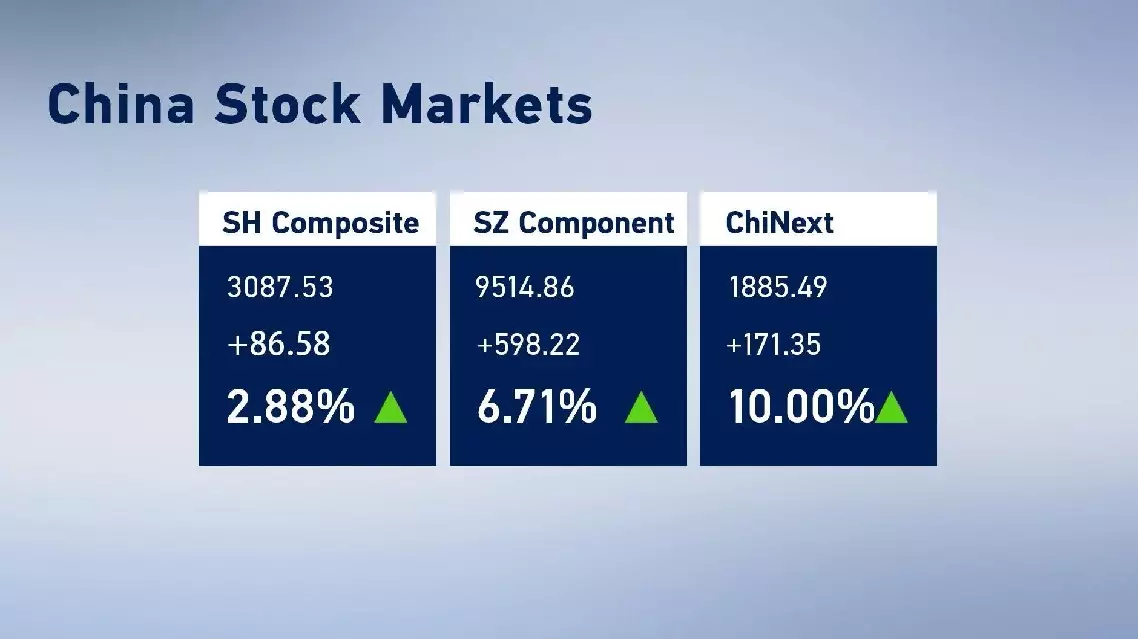Experts are expressing strong optimism about the Chinese stocks as the market logged its best weekly performance in 16 years, buoyed by a slew of government stimulus measures.
While the Shenzhen Component Index surged 6.7 percent the benchmark Shanghai Composite Index advanced by less than 3 percent. This was most likely due to system glitches, resulting in slow transaction confirmations. The Nasdaq-style ChiNext Index skyrocketed 10 percent, the best daily performance to date. On a weekly basis, the Shanghai Composite gained 13 percent, the Shenzhen Component 18 percent and the ChiNext 23 percent. The upbeat sentiment was shared by investors in Hong Kong where the Hang Seng Index gained 3.5 percent.
This comes after Beijing announced measures to boost the economy, including cutting the reserve requirement ratio by half a percentage point and cutting the 7-day reverse repo rate by 0.2 percentage points to 1.5 percent, with effect from Friday.
Last week, the US Federal Reserve also cut its interest rates by half a percentage point.
Wall Street is also jumping in on Chinese stocks, with billionaire investor David Tepper saying in an interview that he's going all-in on China.
An expert from the GROW investment group, Hao Hong, told China Central Television Network (CGTN) that he believes for both the Hong Kong and Chinese markets, the bullish sentiment will rage on, and it's a celebration of the country's 75th National Day.
Gary NG from Natixis highlights the positive outlook for both A and H shares, noting that recent stimulus and regulatory relaxations have improved market sentiment. He noted that the general direction of Hong Kong's equities is more optimistic than before. However, he also cautioned that sustainable growth will depend on genuine improvements in the macro economy and corporate profits.
Andy Mok, a senior research fellow at the Center for China and Globalization, elaborated on the comprehensive nature of the recent policy initiatives.
"We shouldn't just look at the monetary policy announcement. If we look at this - what some are calling a barrage of policy announcements or a blitzkrieg on the demand side, we talked a little bit about the monetary side, but I think from there we can see the lowering of mortgage rates, of course, has an impact. It provides more money in people's pockets that they potentially could spend. More importantly, on the demand side, the announcement from the Politburo that first of all the decline in the real estate market has to be addressed, and I think that's incredibly important. I think no one disagrees that this would be one of the biggest things that could restore consumer confidence. Fiscal policies as well, some direct cash transfers have been announced. The specific details I don't think have been made clear yet, but these are very directly targeted towards consumer demand. And I believe the phrase that was used was that the masses of the government are responding to the concerns of the masses," he said.
Mok further emphasized the valuation of the Chinese market, describing it as one of the most affordable globally, with a price-to-earnings ratio below ten.
"I think there's been a lot of pessimism in the last few years, and I think that of course it is overdone. So we're seeing some bounce back from that. These policy measures we talked about just now, and the global macro environment as well — the half-point cut by the Fed we are seeing [are contributing to it]. We're starting to see and we'll continue to see a rotation out of more expensive markets like the U.S. into emerging markets, and China in particular. And I think we are seeing these animal spirits and sentiments starting to turn," he said.

Chinese stocks rally as experts highlight economic optimism









